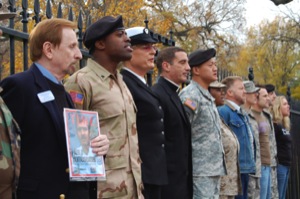
On Friday, March 18, 12 of the 13 activists who joined together for a direct action on the White House fence met for a court date in Washington D.C. The 13 of us who had handcuffed ourselves to the White House fence on Nov. 13, 2010, were a group of LGBT community military service veterans and LGBT community activists – we wanted to see Don’t Ask, Don’t Tell (DADT) repealed.
The 12 of us who were at the courthouse (one of us was ill and couldn’t make it) and our two attorneys agreed, before going into court, to go to trial over our arrest. There is an issue for the 12 of us – we as a group perceive that the U.S. District Attorney representing the federal government is too aggressively prosecuting this case. There is a free speech issue that appears to be at play here, and the zealous prosecution by the federal government appears to us to be one of message censorship.
The facts of our case aren’t in dispute. The 13 of us handcuffed ourselves to the White House fence, chanting “I am somebody” and raising our free fists to send the message that the President and Congress needed to act to repeal DADT, and allow lesbian, gay, and bisexual servicemembers to serve openly.
In previous GetEQUAL direct actions at the White House – as well as other organizations that have protested other issues about the vicinity of the White House – those involved in the direct actions and protests have usually been charged under the District Of Columbia Municipal Regulations (DCMR) under the Disorderly Conduct or Failure To Obey A Lawful Order (given by a law enforcement officer) have been given the opportunity to “post and forfeit” a bond to resolve their/our cases. There is no history of a conviction with this action.
This time, the federal government has charged the “White House 13” under the Code Of Federal Regulations (CFR), and pleading would result in a federal conviction on one’s record.
We have two teachers in the White House 13 whose convictions would likely result in the loss of their jobs. We have two prior service people in the group who plan on rejoining the services when LGB people are soon allowed to serve openly (which they currently are still not allowed to do), and convictions on their records could result in those two not being able to rejoin the service. The judge seemed particularly interested in those stories; he indicated to the federal government’s attorney that those concerns should be given significant consideration in how the government proceeds on this case.
Our attorneys suggested a complicated solution to which the net result would be that we be allowed to “post and forfeit” after appealing to a DCMR Disorderly Conduct charge. Short of that, our attorneys suggested that we be allowed to plead to the DCMR Disorderly Conduct charge, and the conviction be held in abeyance – if we stay out of trouble in D.C. for six to nine months, the charges would be dismissed.
The federal government’s attorney literally talked about how on our arrest forms someone checked a box that stated we were not allowed to “post and forfeit,” and even though no one can identify who checked the box, or why the box was checked, that checking of that box has tied the federal government’s hands. She also argued that under the plain meaning of “boisterous” we didn’t meet an element of the statute – she argued that our protest wasn’t boisterous.
There is video, and we are boisterous.
Resolution of our case didn’t happen on March 18. We’re going to either plead in court to a DCMR charge on September 19, 2011, or as a unified group we’re going to trial under a CFR based charge.
It feels to me as a defendant in this case that the zealous prosecution by the federal government for the White House 13 is heavy-handed. It appears to me that the zealous prosecution against us is an attempt by the federal government to send a message to other potential non-violent protestors.
That message is this: publicly protesting the federal government’s positions on issues is going to be with higher stakes in the future than it has been in the past. And, it appears to me that the goal is to censor ideas that the federal government finds uncomfortable or unpalatable.
This, in my opinion, is the kind of garbage we’re going to have to deal with to move LGBT equality issues forward, just as dealing with that kind of garbage is what all civil rights movements have had to deal with in the past.
To quote Cesar Chavez: “It takes a lot of punishment to be able to do anything to change the social order.”










